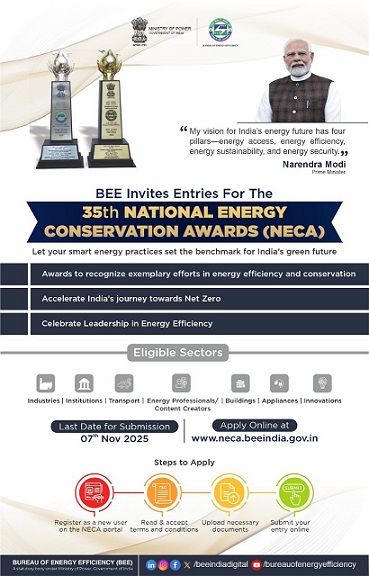- About Us
-
Programmes
- Awareness and Outreach
- Energy Efficiency in Buildings
- National Certification Examination
- Demand Side Management
- Energy Efficiency in Transport Sector
- Perform Achieve Trade (PAT)
- Energy Efficiency in SMEs
- Financing Energy Efficiency
- State Designated Agency
- International Cooperation
- ESCOs
- Miscelleneous
- Standards & Labeling
- NMEEE
- NECA
- Carbon Market
- Energy Data Management Unit
- Small Medium Enterprise
- Renewable Consumption Obligations (RCO)
- Tenders
- Publication
- Careers
- Events Calendar
- Feedback
- Contact Us
X

X

Pause
RCO amendment notification dt 27th Sept 2025
-
Basic page
Inviting comments on the revised draft CAFE 3 norms for the next cycle (2027-28 to 2031-32) -reg
-
Basic page
Target setting notification
-
News/Press Releases
Flagship Programmes

Buildings Energy Efficiency
Energy Conservation Building Code

Star Label
Standards and Labeling

PAT
Energy Efficiency in Large Industry

SME
Energy Efficiency in Small & Medium Industry

SDA
Energy Efficiency in States

DSM
Energy Efficiency Through Demand Side Management
Important Links
| Sr. No. | Description of content | Type | Link |
|---|---|---|---|
| 1 | RCO amendment notification dt 27th Sept 2025 | RCO | Link |
| 2 | Inviting comments on the revised draft CAFE 3 norms for the next cycle (2027-28 to 2031-32) -reg | Draft Proposal | Link |
| 3 | Inviting Comments on the Draft Proposal for Future Fuel Efficiency Norms for HDVs, MDVs & LDVs | Draft Proposal | Link |
| 4 | Extension of deadline for RCO Compliance for FY 2024-2025 | Content | Link |
| 5 | Public Notice- Recruitment for the Post of Assistant Director (Technical) – Vacancy No. 1/2025 | Public Notice | Link |
| 6 | Inviting Comments on Notification for Energy Conservation (Compliance Enforcement) Rules, 2025 | Public Consultation | Link |
| 7 | Inviting Comments on Revised Draft notification on RCO under EC Act. | Public Consultation | Link |
| 8 | Seeking stakeholder comments on Provisionally eligible Accredited Carbon Verification Agency under CCTS-Round2 | Carbon Market | Link |
| 9 | Greenhouse Gases Emission Intensity Target Rules 2025 | Carbon Market | Link |
| 10 | Advertisment for Hiring of Technical Professionals for GEF-UNDP Project dated 15th October 2025 | Careers | Link |
| 11 | Building Star Labeling Program- is under revision. No application shall be accepted by BEE with effect from 25th September 2025 until further notice. | Notice | Link |
| 12 | Modification of Application Form for Joint Director & Assistant Director (Technical) Ad. (March 2024 & May 2025) | Notice | Link |
Gallery
Currently the content is being updated. Coming soon.
-
-
Video Name:National Painting Competition 2025 | Register Now & Let Your Art ShineFormat:MP4Language:English
-
-
-
Video Name:National Painting Competition 2025Format:MP4Language:Hindi
-
-
-
Video Name:Green Building| Eco-Friendly| Green Building Revolution videoFormat:MP4Language:English
-
-
-
Video Name:BEE Star Label Appliances| Need of Energy Efficiency| Ways to be energy efficient and save money
-





.png)

.png)
.png)

.png)
.png)
.png)

.png)
.png)

.jpg)









.png)


